Ethical Dilemmas in Accounting Profession
VerifiedAdded on 2023/03/23
|16
|4419
|80
AI Summary
This essay aims to identify three ethical dilemmas accounting profession has been encountering and safeguards which can eradicate or reduce the pressure to a satisfactory level.
Contribute Materials
Your contribution can guide someone’s learning journey. Share your
documents today.
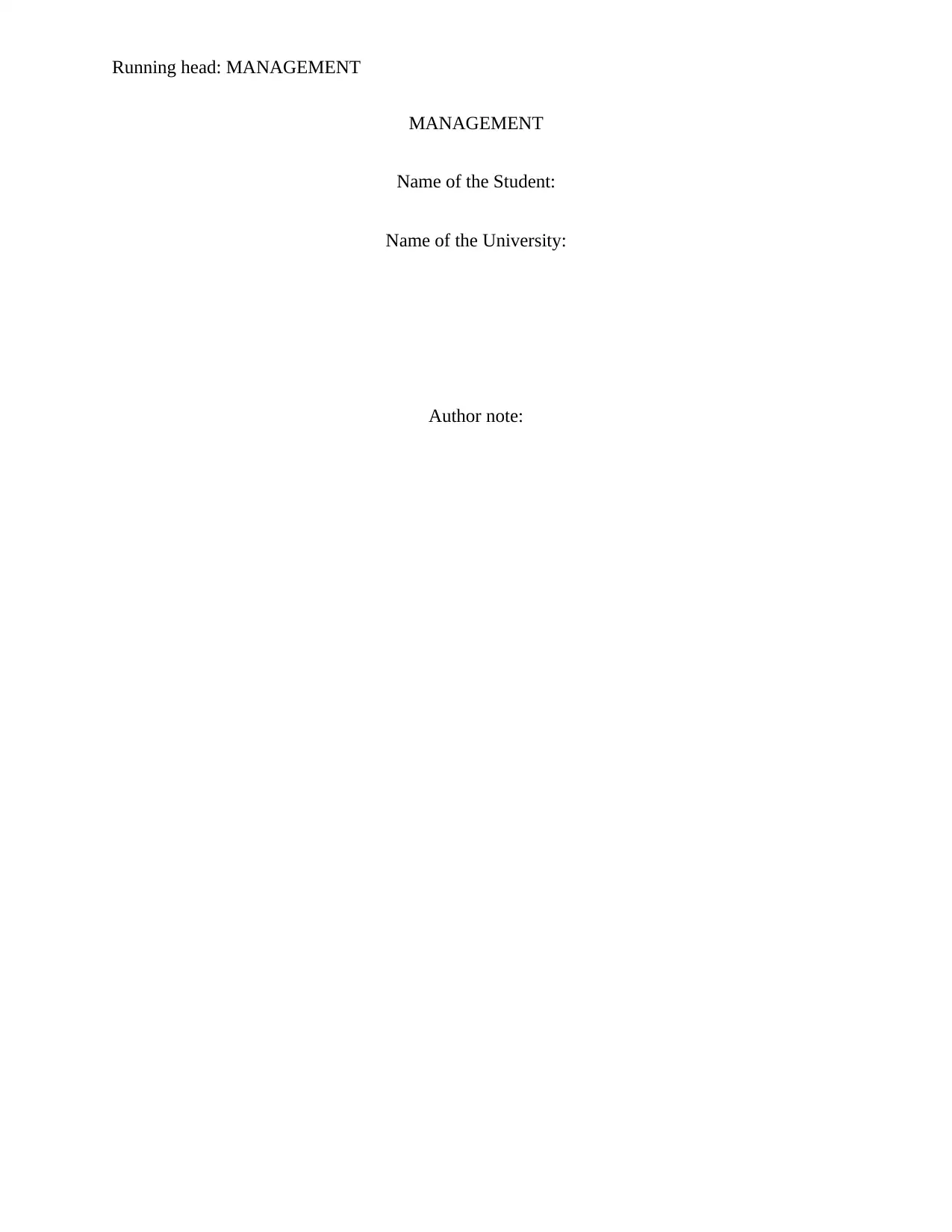
Running head: MANAGEMENT
MANAGEMENT
Name of the Student:
Name of the University:
Author note:
MANAGEMENT
Name of the Student:
Name of the University:
Author note:
Secure Best Marks with AI Grader
Need help grading? Try our AI Grader for instant feedback on your assignments.
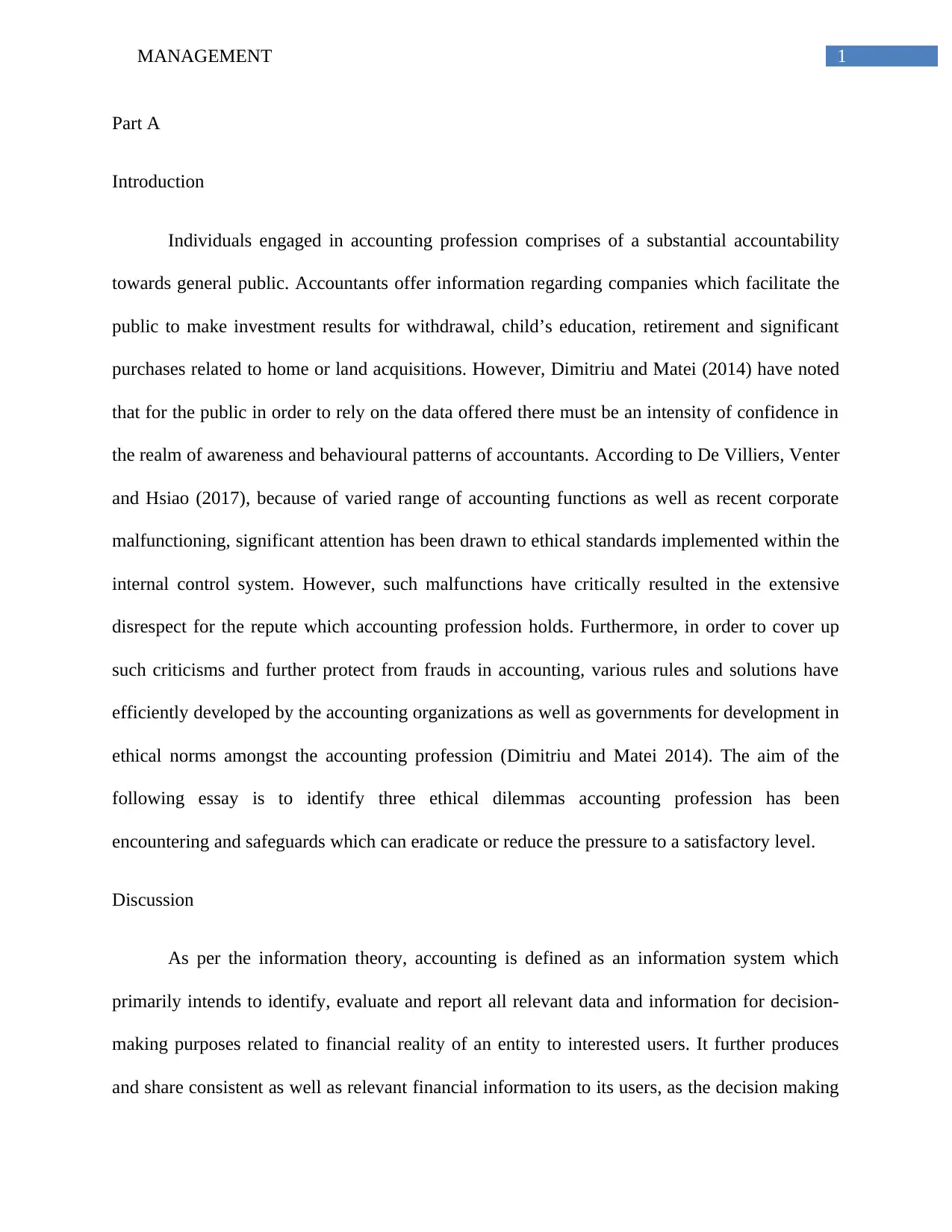
1MANAGEMENT
Part A
Introduction
Individuals engaged in accounting profession comprises of a substantial accountability
towards general public. Accountants offer information regarding companies which facilitate the
public to make investment results for withdrawal, child’s education, retirement and significant
purchases related to home or land acquisitions. However, Dimitriu and Matei (2014) have noted
that for the public in order to rely on the data offered there must be an intensity of confidence in
the realm of awareness and behavioural patterns of accountants. According to De Villiers, Venter
and Hsiao (2017), because of varied range of accounting functions as well as recent corporate
malfunctioning, significant attention has been drawn to ethical standards implemented within the
internal control system. However, such malfunctions have critically resulted in the extensive
disrespect for the repute which accounting profession holds. Furthermore, in order to cover up
such criticisms and further protect from frauds in accounting, various rules and solutions have
efficiently developed by the accounting organizations as well as governments for development in
ethical norms amongst the accounting profession (Dimitriu and Matei 2014). The aim of the
following essay is to identify three ethical dilemmas accounting profession has been
encountering and safeguards which can eradicate or reduce the pressure to a satisfactory level.
Discussion
As per the information theory, accounting is defined as an information system which
primarily intends to identify, evaluate and report all relevant data and information for decision-
making purposes related to financial reality of an entity to interested users. It further produces
and share consistent as well as relevant financial information to its users, as the decision making
Part A
Introduction
Individuals engaged in accounting profession comprises of a substantial accountability
towards general public. Accountants offer information regarding companies which facilitate the
public to make investment results for withdrawal, child’s education, retirement and significant
purchases related to home or land acquisitions. However, Dimitriu and Matei (2014) have noted
that for the public in order to rely on the data offered there must be an intensity of confidence in
the realm of awareness and behavioural patterns of accountants. According to De Villiers, Venter
and Hsiao (2017), because of varied range of accounting functions as well as recent corporate
malfunctioning, significant attention has been drawn to ethical standards implemented within the
internal control system. However, such malfunctions have critically resulted in the extensive
disrespect for the repute which accounting profession holds. Furthermore, in order to cover up
such criticisms and further protect from frauds in accounting, various rules and solutions have
efficiently developed by the accounting organizations as well as governments for development in
ethical norms amongst the accounting profession (Dimitriu and Matei 2014). The aim of the
following essay is to identify three ethical dilemmas accounting profession has been
encountering and safeguards which can eradicate or reduce the pressure to a satisfactory level.
Discussion
As per the information theory, accounting is defined as an information system which
primarily intends to identify, evaluate and report all relevant data and information for decision-
making purposes related to financial reality of an entity to interested users. It further produces
and share consistent as well as relevant financial information to its users, as the decision making
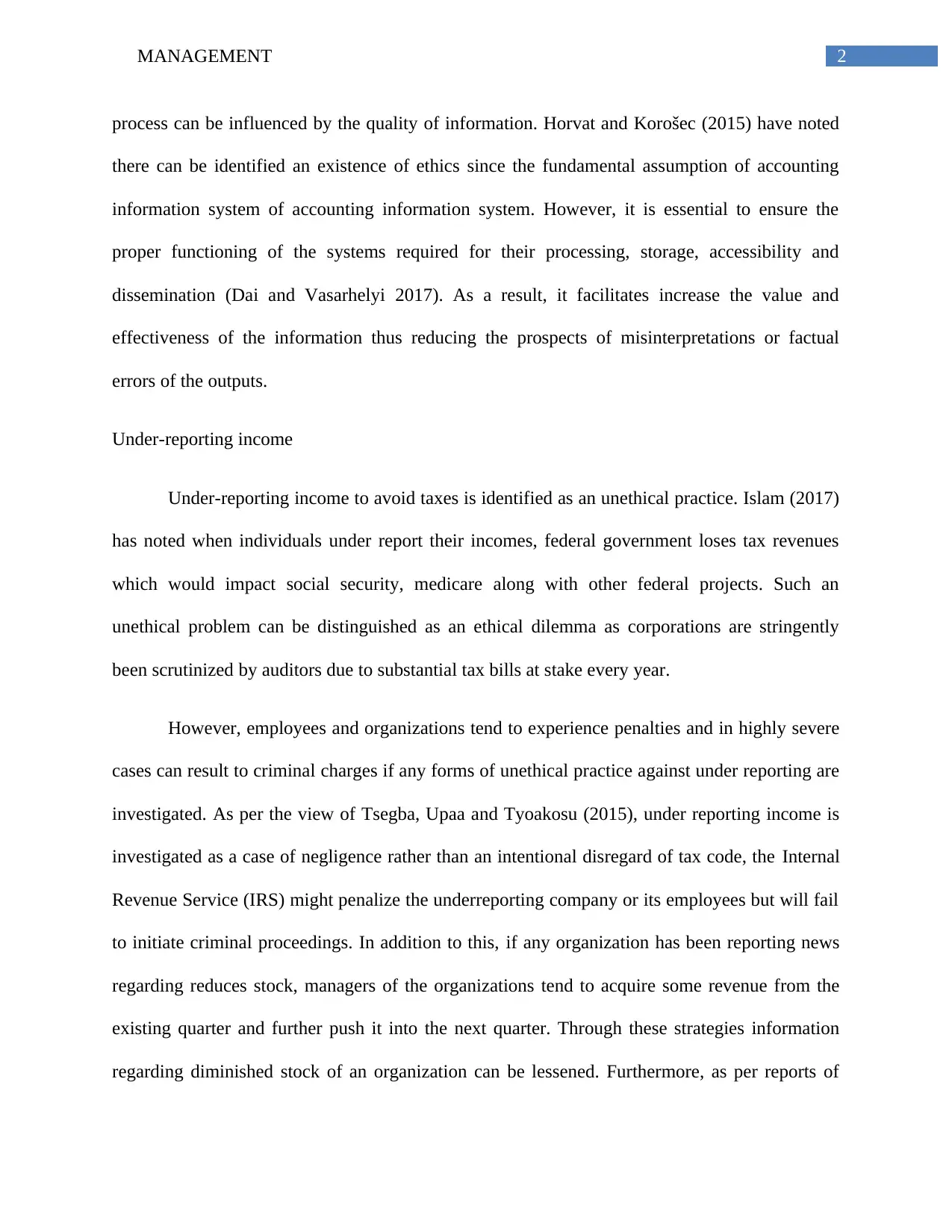
2MANAGEMENT
process can be influenced by the quality of information. Horvat and Korošec (2015) have noted
there can be identified an existence of ethics since the fundamental assumption of accounting
information system of accounting information system. However, it is essential to ensure the
proper functioning of the systems required for their processing, storage, accessibility and
dissemination (Dai and Vasarhelyi 2017). As a result, it facilitates increase the value and
effectiveness of the information thus reducing the prospects of misinterpretations or factual
errors of the outputs.
Under-reporting income
Under-reporting income to avoid taxes is identified as an unethical practice. Islam (2017)
has noted when individuals under report their incomes, federal government loses tax revenues
which would impact social security, medicare along with other federal projects. Such an
unethical problem can be distinguished as an ethical dilemma as corporations are stringently
been scrutinized by auditors due to substantial tax bills at stake every year.
However, employees and organizations tend to experience penalties and in highly severe
cases can result to criminal charges if any forms of unethical practice against under reporting are
investigated. As per the view of Tsegba, Upaa and Tyoakosu (2015), under reporting income is
investigated as a case of negligence rather than an intentional disregard of tax code, the Internal
Revenue Service (IRS) might penalize the underreporting company or its employees but will fail
to initiate criminal proceedings. In addition to this, if any organization has been reporting news
regarding reduces stock, managers of the organizations tend to acquire some revenue from the
existing quarter and further push it into the next quarter. Through these strategies information
regarding diminished stock of an organization can be lessened. Furthermore, as per reports of
process can be influenced by the quality of information. Horvat and Korošec (2015) have noted
there can be identified an existence of ethics since the fundamental assumption of accounting
information system of accounting information system. However, it is essential to ensure the
proper functioning of the systems required for their processing, storage, accessibility and
dissemination (Dai and Vasarhelyi 2017). As a result, it facilitates increase the value and
effectiveness of the information thus reducing the prospects of misinterpretations or factual
errors of the outputs.
Under-reporting income
Under-reporting income to avoid taxes is identified as an unethical practice. Islam (2017)
has noted when individuals under report their incomes, federal government loses tax revenues
which would impact social security, medicare along with other federal projects. Such an
unethical problem can be distinguished as an ethical dilemma as corporations are stringently
been scrutinized by auditors due to substantial tax bills at stake every year.
However, employees and organizations tend to experience penalties and in highly severe
cases can result to criminal charges if any forms of unethical practice against under reporting are
investigated. As per the view of Tsegba, Upaa and Tyoakosu (2015), under reporting income is
investigated as a case of negligence rather than an intentional disregard of tax code, the Internal
Revenue Service (IRS) might penalize the underreporting company or its employees but will fail
to initiate criminal proceedings. In addition to this, if any organization has been reporting news
regarding reduces stock, managers of the organizations tend to acquire some revenue from the
existing quarter and further push it into the next quarter. Through these strategies information
regarding diminished stock of an organization can be lessened. Furthermore, as per reports of
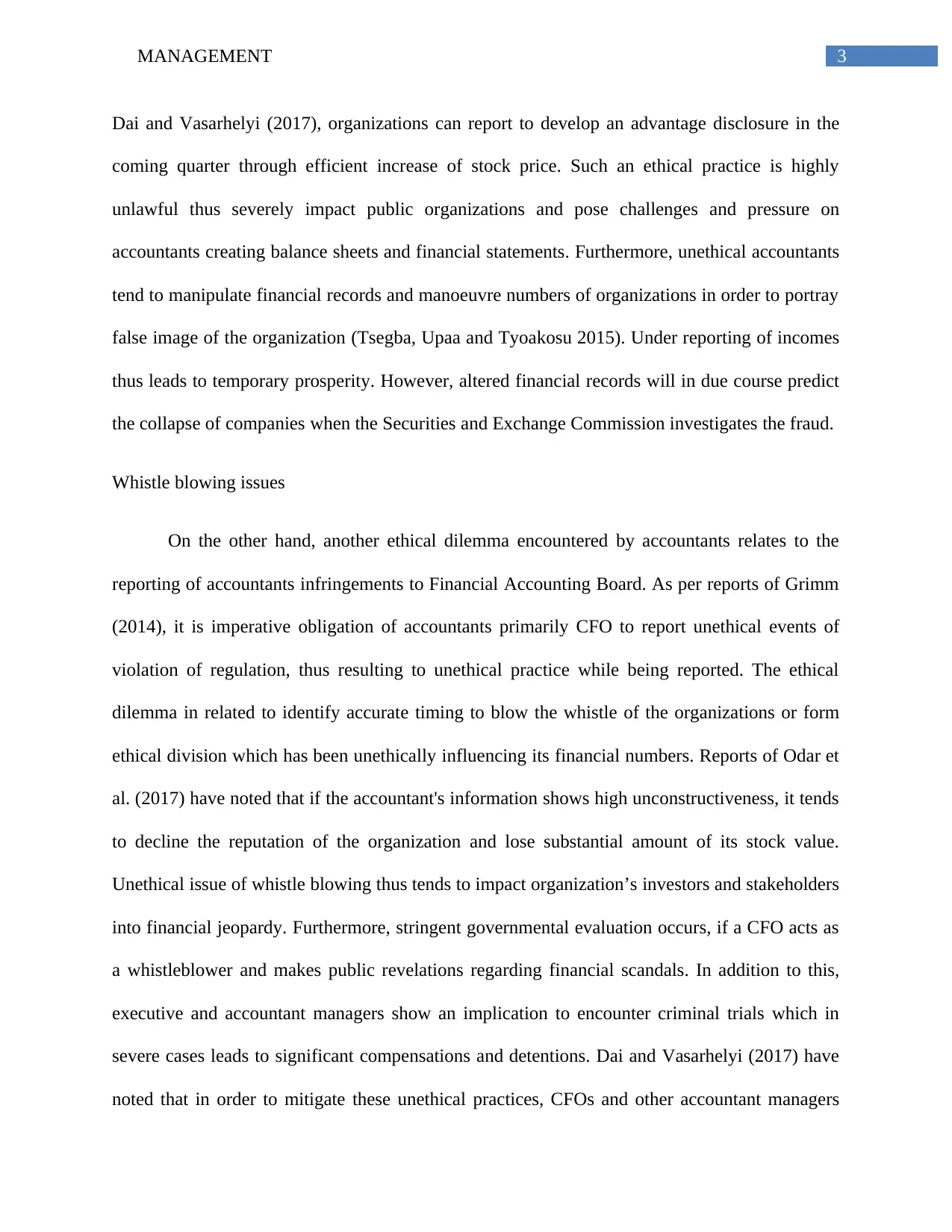
3MANAGEMENT
Dai and Vasarhelyi (2017), organizations can report to develop an advantage disclosure in the
coming quarter through efficient increase of stock price. Such an ethical practice is highly
unlawful thus severely impact public organizations and pose challenges and pressure on
accountants creating balance sheets and financial statements. Furthermore, unethical accountants
tend to manipulate financial records and manoeuvre numbers of organizations in order to portray
false image of the organization (Tsegba, Upaa and Tyoakosu 2015). Under reporting of incomes
thus leads to temporary prosperity. However, altered financial records will in due course predict
the collapse of companies when the Securities and Exchange Commission investigates the fraud.
Whistle blowing issues
On the other hand, another ethical dilemma encountered by accountants relates to the
reporting of accountants infringements to Financial Accounting Board. As per reports of Grimm
(2014), it is imperative obligation of accountants primarily CFO to report unethical events of
violation of regulation, thus resulting to unethical practice while being reported. The ethical
dilemma in related to identify accurate timing to blow the whistle of the organizations or form
ethical division which has been unethically influencing its financial numbers. Reports of Odar et
al. (2017) have noted that if the accountant's information shows high unconstructiveness, it tends
to decline the reputation of the organization and lose substantial amount of its stock value.
Unethical issue of whistle blowing thus tends to impact organization’s investors and stakeholders
into financial jeopardy. Furthermore, stringent governmental evaluation occurs, if a CFO acts as
a whistleblower and makes public revelations regarding financial scandals. In addition to this,
executive and accountant managers show an implication to encounter criminal trials which in
severe cases leads to significant compensations and detentions. Dai and Vasarhelyi (2017) have
noted that in order to mitigate these unethical practices, CFOs and other accountant managers
Dai and Vasarhelyi (2017), organizations can report to develop an advantage disclosure in the
coming quarter through efficient increase of stock price. Such an ethical practice is highly
unlawful thus severely impact public organizations and pose challenges and pressure on
accountants creating balance sheets and financial statements. Furthermore, unethical accountants
tend to manipulate financial records and manoeuvre numbers of organizations in order to portray
false image of the organization (Tsegba, Upaa and Tyoakosu 2015). Under reporting of incomes
thus leads to temporary prosperity. However, altered financial records will in due course predict
the collapse of companies when the Securities and Exchange Commission investigates the fraud.
Whistle blowing issues
On the other hand, another ethical dilemma encountered by accountants relates to the
reporting of accountants infringements to Financial Accounting Board. As per reports of Grimm
(2014), it is imperative obligation of accountants primarily CFO to report unethical events of
violation of regulation, thus resulting to unethical practice while being reported. The ethical
dilemma in related to identify accurate timing to blow the whistle of the organizations or form
ethical division which has been unethically influencing its financial numbers. Reports of Odar et
al. (2017) have noted that if the accountant's information shows high unconstructiveness, it tends
to decline the reputation of the organization and lose substantial amount of its stock value.
Unethical issue of whistle blowing thus tends to impact organization’s investors and stakeholders
into financial jeopardy. Furthermore, stringent governmental evaluation occurs, if a CFO acts as
a whistleblower and makes public revelations regarding financial scandals. In addition to this,
executive and accountant managers show an implication to encounter criminal trials which in
severe cases leads to significant compensations and detentions. Dai and Vasarhelyi (2017) have
noted that in order to mitigate these unethical practices, CFOs and other accountant managers
Secure Best Marks with AI Grader
Need help grading? Try our AI Grader for instant feedback on your assignments.
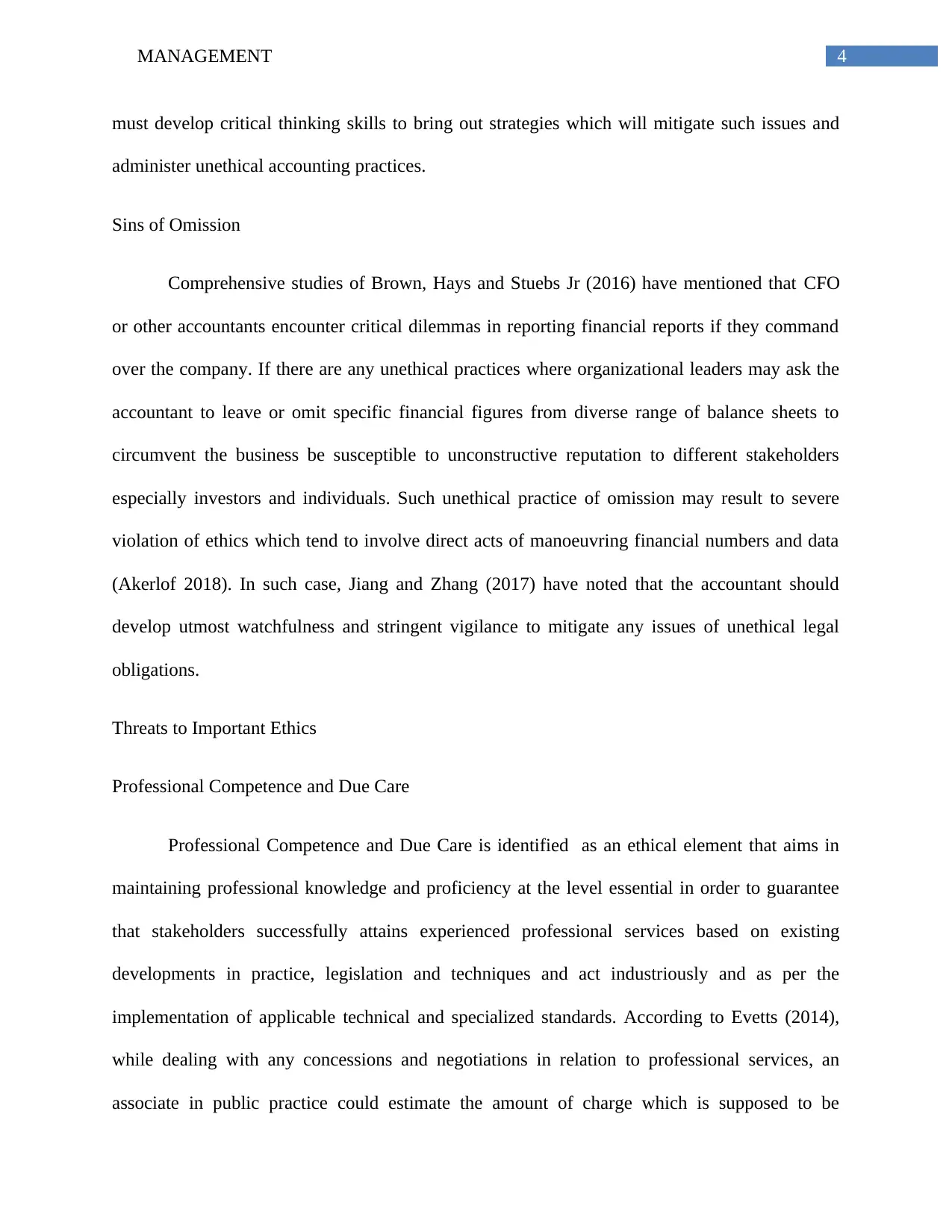
4MANAGEMENT
must develop critical thinking skills to bring out strategies which will mitigate such issues and
administer unethical accounting practices.
Sins of Omission
Comprehensive studies of Brown, Hays and Stuebs Jr (2016) have mentioned that CFO
or other accountants encounter critical dilemmas in reporting financial reports if they command
over the company. If there are any unethical practices where organizational leaders may ask the
accountant to leave or omit specific financial figures from diverse range of balance sheets to
circumvent the business be susceptible to unconstructive reputation to different stakeholders
especially investors and individuals. Such unethical practice of omission may result to severe
violation of ethics which tend to involve direct acts of manoeuvring financial numbers and data
(Akerlof 2018). In such case, Jiang and Zhang (2017) have noted that the accountant should
develop utmost watchfulness and stringent vigilance to mitigate any issues of unethical legal
obligations.
Threats to Important Ethics
Professional Competence and Due Care
Professional Competence and Due Care is identified as an ethical element that aims in
maintaining professional knowledge and proficiency at the level essential in order to guarantee
that stakeholders successfully attains experienced professional services based on existing
developments in practice, legislation and techniques and act industriously and as per the
implementation of applicable technical and specialized standards. According to Evetts (2014),
while dealing with any concessions and negotiations in relation to professional services, an
associate in public practice could estimate the amount of charge which is supposed to be
must develop critical thinking skills to bring out strategies which will mitigate such issues and
administer unethical accounting practices.
Sins of Omission
Comprehensive studies of Brown, Hays and Stuebs Jr (2016) have mentioned that CFO
or other accountants encounter critical dilemmas in reporting financial reports if they command
over the company. If there are any unethical practices where organizational leaders may ask the
accountant to leave or omit specific financial figures from diverse range of balance sheets to
circumvent the business be susceptible to unconstructive reputation to different stakeholders
especially investors and individuals. Such unethical practice of omission may result to severe
violation of ethics which tend to involve direct acts of manoeuvring financial numbers and data
(Akerlof 2018). In such case, Jiang and Zhang (2017) have noted that the accountant should
develop utmost watchfulness and stringent vigilance to mitigate any issues of unethical legal
obligations.
Threats to Important Ethics
Professional Competence and Due Care
Professional Competence and Due Care is identified as an ethical element that aims in
maintaining professional knowledge and proficiency at the level essential in order to guarantee
that stakeholders successfully attains experienced professional services based on existing
developments in practice, legislation and techniques and act industriously and as per the
implementation of applicable technical and specialized standards. According to Evetts (2014),
while dealing with any concessions and negotiations in relation to professional services, an
associate in public practice could estimate the amount of charge which is supposed to be
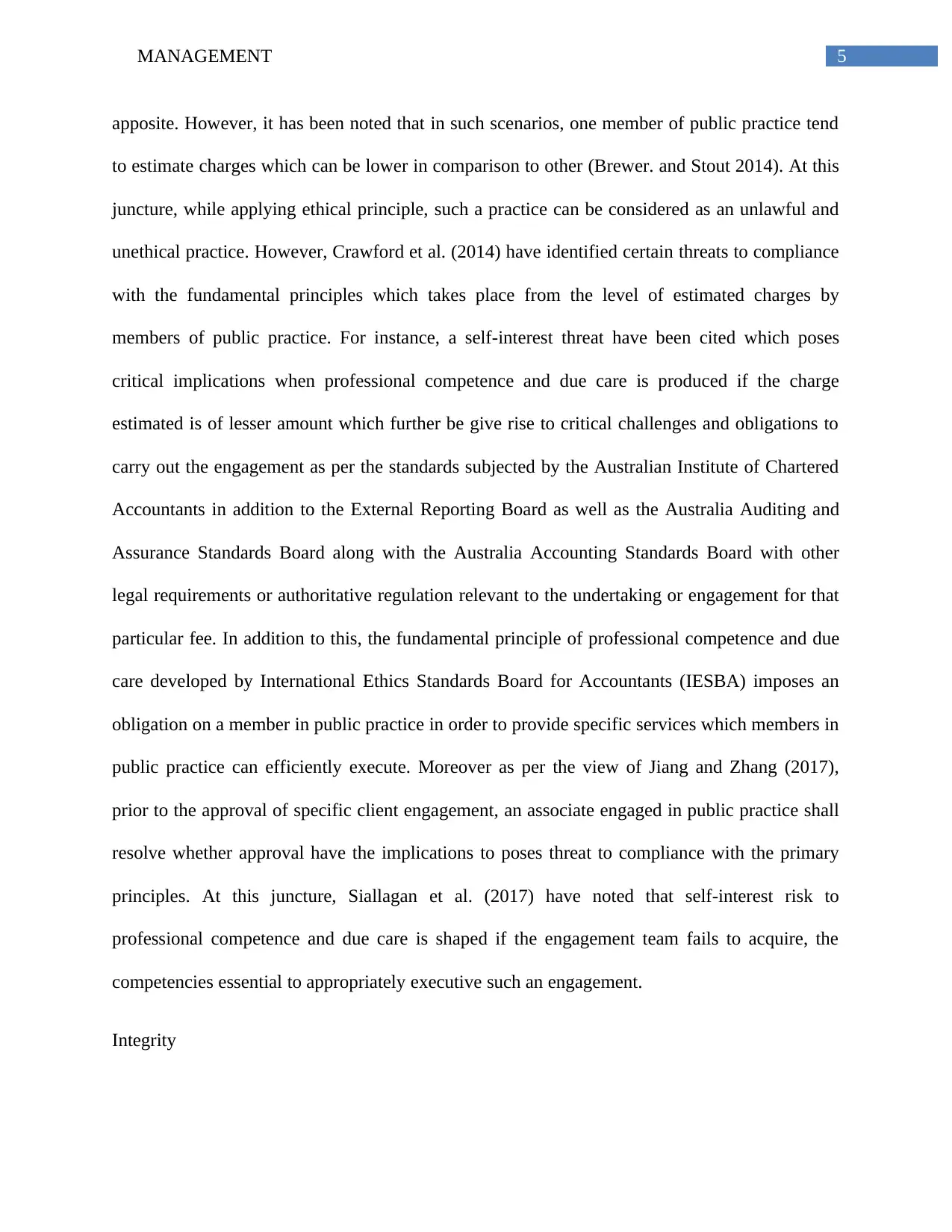
5MANAGEMENT
apposite. However, it has been noted that in such scenarios, one member of public practice tend
to estimate charges which can be lower in comparison to other (Brewer. and Stout 2014). At this
juncture, while applying ethical principle, such a practice can be considered as an unlawful and
unethical practice. However, Crawford et al. (2014) have identified certain threats to compliance
with the fundamental principles which takes place from the level of estimated charges by
members of public practice. For instance, a self-interest threat have been cited which poses
critical implications when professional competence and due care is produced if the charge
estimated is of lesser amount which further be give rise to critical challenges and obligations to
carry out the engagement as per the standards subjected by the Australian Institute of Chartered
Accountants in addition to the External Reporting Board as well as the Australia Auditing and
Assurance Standards Board along with the Australia Accounting Standards Board with other
legal requirements or authoritative regulation relevant to the undertaking or engagement for that
particular fee. In addition to this, the fundamental principle of professional competence and due
care developed by International Ethics Standards Board for Accountants (IESBA) imposes an
obligation on a member in public practice in order to provide specific services which members in
public practice can efficiently execute. Moreover as per the view of Jiang and Zhang (2017),
prior to the approval of specific client engagement, an associate engaged in public practice shall
resolve whether approval have the implications to poses threat to compliance with the primary
principles. At this juncture, Siallagan et al. (2017) have noted that self-interest risk to
professional competence and due care is shaped if the engagement team fails to acquire, the
competencies essential to appropriately executive such an engagement.
Integrity
apposite. However, it has been noted that in such scenarios, one member of public practice tend
to estimate charges which can be lower in comparison to other (Brewer. and Stout 2014). At this
juncture, while applying ethical principle, such a practice can be considered as an unlawful and
unethical practice. However, Crawford et al. (2014) have identified certain threats to compliance
with the fundamental principles which takes place from the level of estimated charges by
members of public practice. For instance, a self-interest threat have been cited which poses
critical implications when professional competence and due care is produced if the charge
estimated is of lesser amount which further be give rise to critical challenges and obligations to
carry out the engagement as per the standards subjected by the Australian Institute of Chartered
Accountants in addition to the External Reporting Board as well as the Australia Auditing and
Assurance Standards Board along with the Australia Accounting Standards Board with other
legal requirements or authoritative regulation relevant to the undertaking or engagement for that
particular fee. In addition to this, the fundamental principle of professional competence and due
care developed by International Ethics Standards Board for Accountants (IESBA) imposes an
obligation on a member in public practice in order to provide specific services which members in
public practice can efficiently execute. Moreover as per the view of Jiang and Zhang (2017),
prior to the approval of specific client engagement, an associate engaged in public practice shall
resolve whether approval have the implications to poses threat to compliance with the primary
principles. At this juncture, Siallagan et al. (2017) have noted that self-interest risk to
professional competence and due care is shaped if the engagement team fails to acquire, the
competencies essential to appropriately executive such an engagement.
Integrity
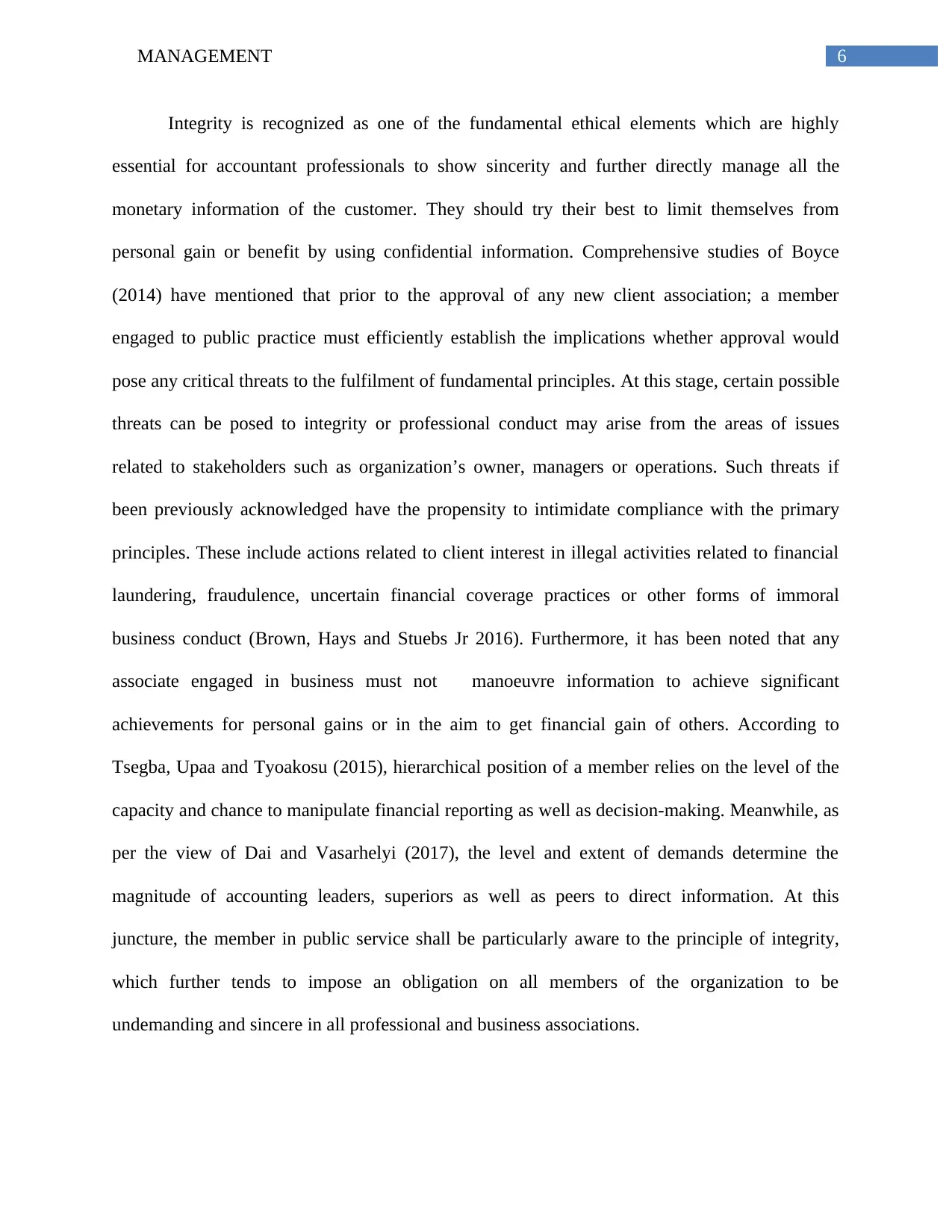
6MANAGEMENT
Integrity is recognized as one of the fundamental ethical elements which are highly
essential for accountant professionals to show sincerity and further directly manage all the
monetary information of the customer. They should try their best to limit themselves from
personal gain or benefit by using confidential information. Comprehensive studies of Boyce
(2014) have mentioned that prior to the approval of any new client association; a member
engaged to public practice must efficiently establish the implications whether approval would
pose any critical threats to the fulfilment of fundamental principles. At this stage, certain possible
threats can be posed to integrity or professional conduct may arise from the areas of issues
related to stakeholders such as organization’s owner, managers or operations. Such threats if
been previously acknowledged have the propensity to intimidate compliance with the primary
principles. These include actions related to client interest in illegal activities related to financial
laundering, fraudulence, uncertain financial coverage practices or other forms of immoral
business conduct (Brown, Hays and Stuebs Jr 2016). Furthermore, it has been noted that any
associate engaged in business must not manoeuvre information to achieve significant
achievements for personal gains or in the aim to get financial gain of others. According to
Tsegba, Upaa and Tyoakosu (2015), hierarchical position of a member relies on the level of the
capacity and chance to manipulate financial reporting as well as decision-making. Meanwhile, as
per the view of Dai and Vasarhelyi (2017), the level and extent of demands determine the
magnitude of accounting leaders, superiors as well as peers to direct information. At this
juncture, the member in public service shall be particularly aware to the principle of integrity,
which further tends to impose an obligation on all members of the organization to be
undemanding and sincere in all professional and business associations.
Integrity is recognized as one of the fundamental ethical elements which are highly
essential for accountant professionals to show sincerity and further directly manage all the
monetary information of the customer. They should try their best to limit themselves from
personal gain or benefit by using confidential information. Comprehensive studies of Boyce
(2014) have mentioned that prior to the approval of any new client association; a member
engaged to public practice must efficiently establish the implications whether approval would
pose any critical threats to the fulfilment of fundamental principles. At this stage, certain possible
threats can be posed to integrity or professional conduct may arise from the areas of issues
related to stakeholders such as organization’s owner, managers or operations. Such threats if
been previously acknowledged have the propensity to intimidate compliance with the primary
principles. These include actions related to client interest in illegal activities related to financial
laundering, fraudulence, uncertain financial coverage practices or other forms of immoral
business conduct (Brown, Hays and Stuebs Jr 2016). Furthermore, it has been noted that any
associate engaged in business must not manoeuvre information to achieve significant
achievements for personal gains or in the aim to get financial gain of others. According to
Tsegba, Upaa and Tyoakosu (2015), hierarchical position of a member relies on the level of the
capacity and chance to manipulate financial reporting as well as decision-making. Meanwhile, as
per the view of Dai and Vasarhelyi (2017), the level and extent of demands determine the
magnitude of accounting leaders, superiors as well as peers to direct information. At this
juncture, the member in public service shall be particularly aware to the principle of integrity,
which further tends to impose an obligation on all members of the organization to be
undemanding and sincere in all professional and business associations.
Paraphrase This Document
Need a fresh take? Get an instant paraphrase of this document with our AI Paraphraser
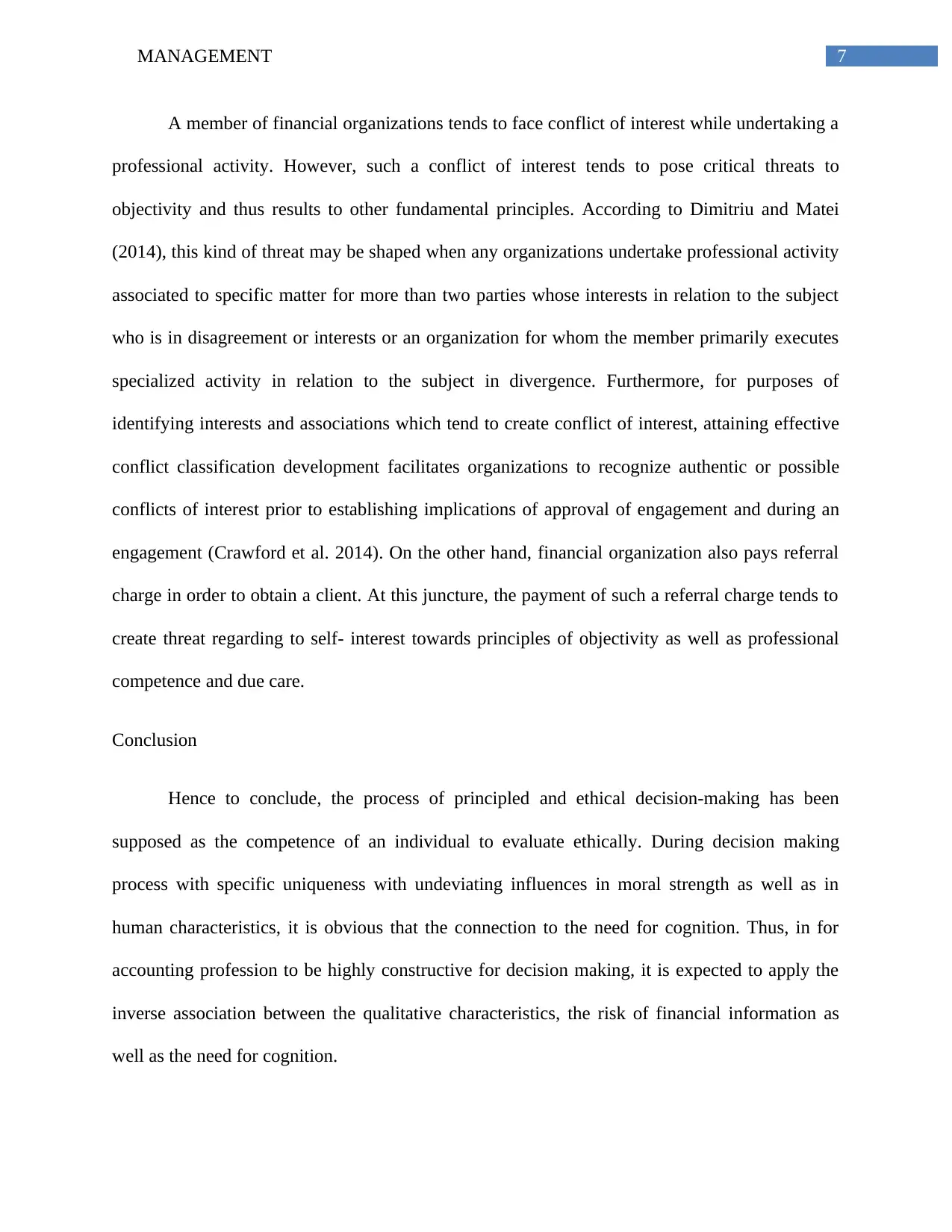
7MANAGEMENT
A member of financial organizations tends to face conflict of interest while undertaking a
professional activity. However, such a conflict of interest tends to pose critical threats to
objectivity and thus results to other fundamental principles. According to Dimitriu and Matei
(2014), this kind of threat may be shaped when any organizations undertake professional activity
associated to specific matter for more than two parties whose interests in relation to the subject
who is in disagreement or interests or an organization for whom the member primarily executes
specialized activity in relation to the subject in divergence. Furthermore, for purposes of
identifying interests and associations which tend to create conflict of interest, attaining effective
conflict classification development facilitates organizations to recognize authentic or possible
conflicts of interest prior to establishing implications of approval of engagement and during an
engagement (Crawford et al. 2014). On the other hand, financial organization also pays referral
charge in order to obtain a client. At this juncture, the payment of such a referral charge tends to
create threat regarding to self- interest towards principles of objectivity as well as professional
competence and due care.
Conclusion
Hence to conclude, the process of principled and ethical decision-making has been
supposed as the competence of an individual to evaluate ethically. During decision making
process with specific uniqueness with undeviating influences in moral strength as well as in
human characteristics, it is obvious that the connection to the need for cognition. Thus, in for
accounting profession to be highly constructive for decision making, it is expected to apply the
inverse association between the qualitative characteristics, the risk of financial information as
well as the need for cognition.
A member of financial organizations tends to face conflict of interest while undertaking a
professional activity. However, such a conflict of interest tends to pose critical threats to
objectivity and thus results to other fundamental principles. According to Dimitriu and Matei
(2014), this kind of threat may be shaped when any organizations undertake professional activity
associated to specific matter for more than two parties whose interests in relation to the subject
who is in disagreement or interests or an organization for whom the member primarily executes
specialized activity in relation to the subject in divergence. Furthermore, for purposes of
identifying interests and associations which tend to create conflict of interest, attaining effective
conflict classification development facilitates organizations to recognize authentic or possible
conflicts of interest prior to establishing implications of approval of engagement and during an
engagement (Crawford et al. 2014). On the other hand, financial organization also pays referral
charge in order to obtain a client. At this juncture, the payment of such a referral charge tends to
create threat regarding to self- interest towards principles of objectivity as well as professional
competence and due care.
Conclusion
Hence to conclude, the process of principled and ethical decision-making has been
supposed as the competence of an individual to evaluate ethically. During decision making
process with specific uniqueness with undeviating influences in moral strength as well as in
human characteristics, it is obvious that the connection to the need for cognition. Thus, in for
accounting profession to be highly constructive for decision making, it is expected to apply the
inverse association between the qualitative characteristics, the risk of financial information as
well as the need for cognition.
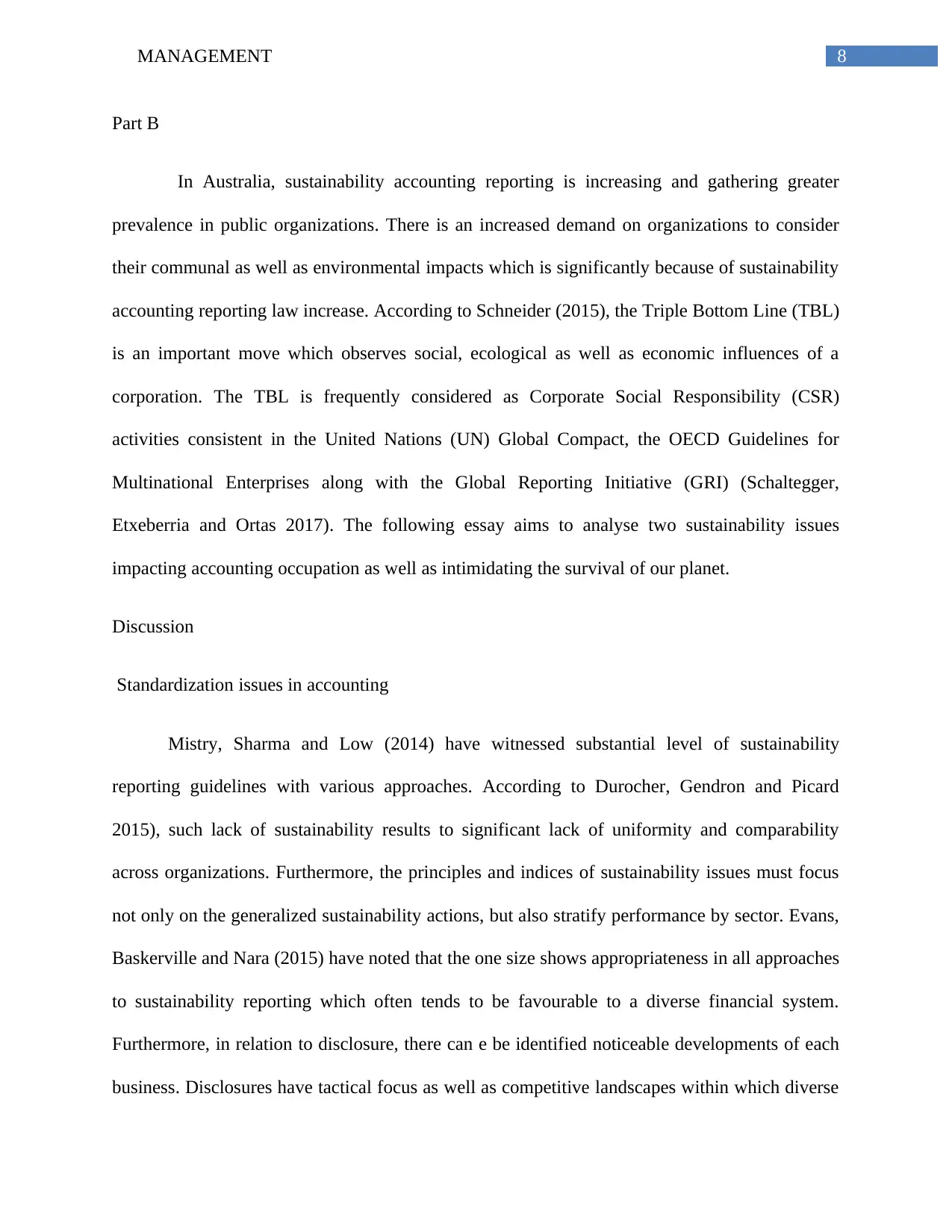
8MANAGEMENT
Part B
In Australia, sustainability accounting reporting is increasing and gathering greater
prevalence in public organizations. There is an increased demand on organizations to consider
their communal as well as environmental impacts which is significantly because of sustainability
accounting reporting law increase. According to Schneider (2015), the Triple Bottom Line (TBL)
is an important move which observes social, ecological as well as economic influences of a
corporation. The TBL is frequently considered as Corporate Social Responsibility (CSR)
activities consistent in the United Nations (UN) Global Compact, the OECD Guidelines for
Multinational Enterprises along with the Global Reporting Initiative (GRI) (Schaltegger,
Etxeberria and Ortas 2017). The following essay aims to analyse two sustainability issues
impacting accounting occupation as well as intimidating the survival of our planet.
Discussion
Standardization issues in accounting
Mistry, Sharma and Low (2014) have witnessed substantial level of sustainability
reporting guidelines with various approaches. According to Durocher, Gendron and Picard
2015), such lack of sustainability results to significant lack of uniformity and comparability
across organizations. Furthermore, the principles and indices of sustainability issues must focus
not only on the generalized sustainability actions, but also stratify performance by sector. Evans,
Baskerville and Nara (2015) have noted that the one size shows appropriateness in all approaches
to sustainability reporting which often tends to be favourable to a diverse financial system.
Furthermore, in relation to disclosure, there can e be identified noticeable developments of each
business. Disclosures have tactical focus as well as competitive landscapes within which diverse
Part B
In Australia, sustainability accounting reporting is increasing and gathering greater
prevalence in public organizations. There is an increased demand on organizations to consider
their communal as well as environmental impacts which is significantly because of sustainability
accounting reporting law increase. According to Schneider (2015), the Triple Bottom Line (TBL)
is an important move which observes social, ecological as well as economic influences of a
corporation. The TBL is frequently considered as Corporate Social Responsibility (CSR)
activities consistent in the United Nations (UN) Global Compact, the OECD Guidelines for
Multinational Enterprises along with the Global Reporting Initiative (GRI) (Schaltegger,
Etxeberria and Ortas 2017). The following essay aims to analyse two sustainability issues
impacting accounting occupation as well as intimidating the survival of our planet.
Discussion
Standardization issues in accounting
Mistry, Sharma and Low (2014) have witnessed substantial level of sustainability
reporting guidelines with various approaches. According to Durocher, Gendron and Picard
2015), such lack of sustainability results to significant lack of uniformity and comparability
across organizations. Furthermore, the principles and indices of sustainability issues must focus
not only on the generalized sustainability actions, but also stratify performance by sector. Evans,
Baskerville and Nara (2015) have noted that the one size shows appropriateness in all approaches
to sustainability reporting which often tends to be favourable to a diverse financial system.
Furthermore, in relation to disclosure, there can e be identified noticeable developments of each
business. Disclosures have tactical focus as well as competitive landscapes within which diverse
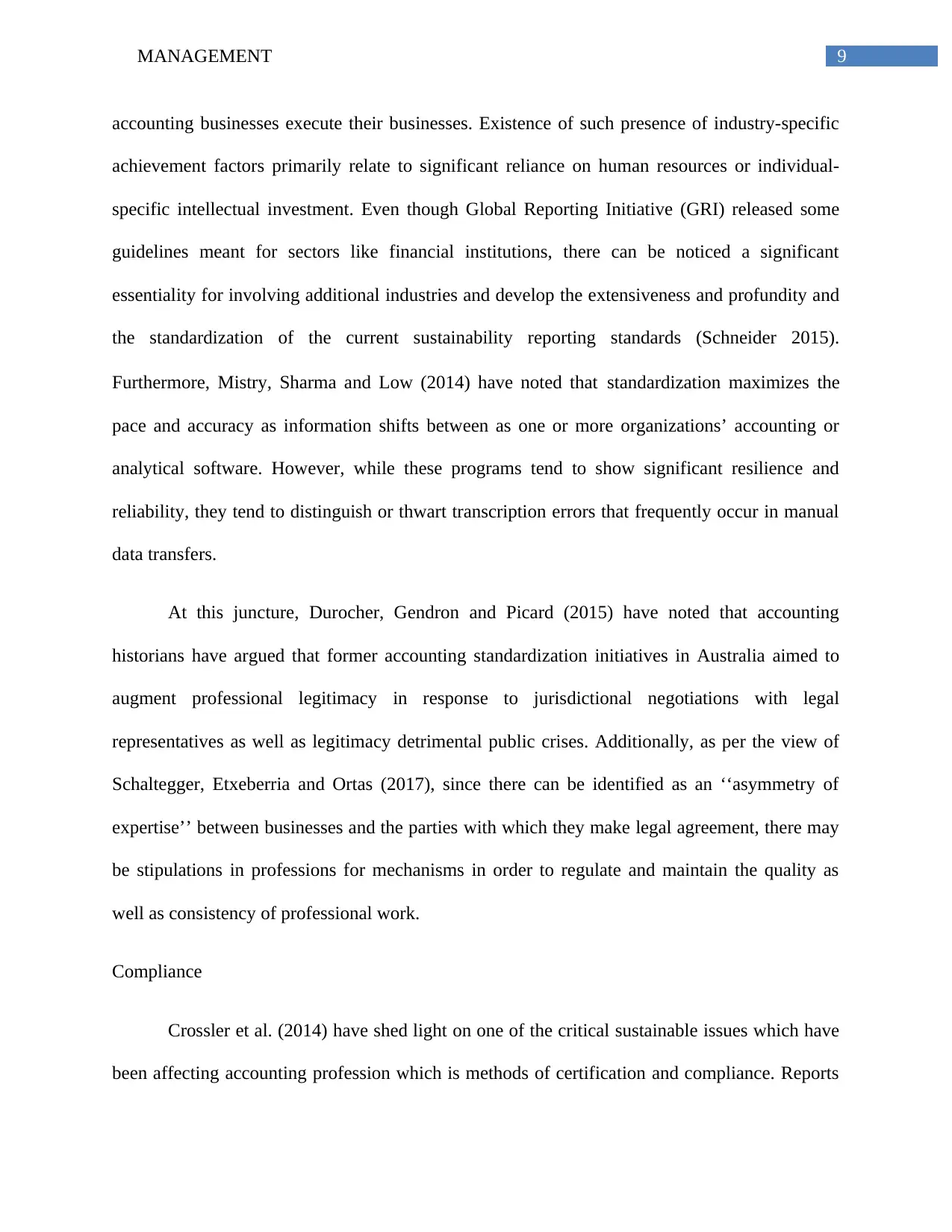
9MANAGEMENT
accounting businesses execute their businesses. Existence of such presence of industry-specific
achievement factors primarily relate to significant reliance on human resources or individual-
specific intellectual investment. Even though Global Reporting Initiative (GRI) released some
guidelines meant for sectors like financial institutions, there can be noticed a significant
essentiality for involving additional industries and develop the extensiveness and profundity and
the standardization of the current sustainability reporting standards (Schneider 2015).
Furthermore, Mistry, Sharma and Low (2014) have noted that standardization maximizes the
pace and accuracy as information shifts between as one or more organizations’ accounting or
analytical software. However, while these programs tend to show significant resilience and
reliability, they tend to distinguish or thwart transcription errors that frequently occur in manual
data transfers.
At this juncture, Durocher, Gendron and Picard (2015) have noted that accounting
historians have argued that former accounting standardization initiatives in Australia aimed to
augment professional legitimacy in response to jurisdictional negotiations with legal
representatives as well as legitimacy detrimental public crises. Additionally, as per the view of
Schaltegger, Etxeberria and Ortas (2017), since there can be identified as an ‘‘asymmetry of
expertise’’ between businesses and the parties with which they make legal agreement, there may
be stipulations in professions for mechanisms in order to regulate and maintain the quality as
well as consistency of professional work.
Compliance
Crossler et al. (2014) have shed light on one of the critical sustainable issues which have
been affecting accounting profession which is methods of certification and compliance. Reports
accounting businesses execute their businesses. Existence of such presence of industry-specific
achievement factors primarily relate to significant reliance on human resources or individual-
specific intellectual investment. Even though Global Reporting Initiative (GRI) released some
guidelines meant for sectors like financial institutions, there can be noticed a significant
essentiality for involving additional industries and develop the extensiveness and profundity and
the standardization of the current sustainability reporting standards (Schneider 2015).
Furthermore, Mistry, Sharma and Low (2014) have noted that standardization maximizes the
pace and accuracy as information shifts between as one or more organizations’ accounting or
analytical software. However, while these programs tend to show significant resilience and
reliability, they tend to distinguish or thwart transcription errors that frequently occur in manual
data transfers.
At this juncture, Durocher, Gendron and Picard (2015) have noted that accounting
historians have argued that former accounting standardization initiatives in Australia aimed to
augment professional legitimacy in response to jurisdictional negotiations with legal
representatives as well as legitimacy detrimental public crises. Additionally, as per the view of
Schaltegger, Etxeberria and Ortas (2017), since there can be identified as an ‘‘asymmetry of
expertise’’ between businesses and the parties with which they make legal agreement, there may
be stipulations in professions for mechanisms in order to regulate and maintain the quality as
well as consistency of professional work.
Compliance
Crossler et al. (2014) have shed light on one of the critical sustainable issues which have
been affecting accounting profession which is methods of certification and compliance. Reports
Secure Best Marks with AI Grader
Need help grading? Try our AI Grader for instant feedback on your assignments.
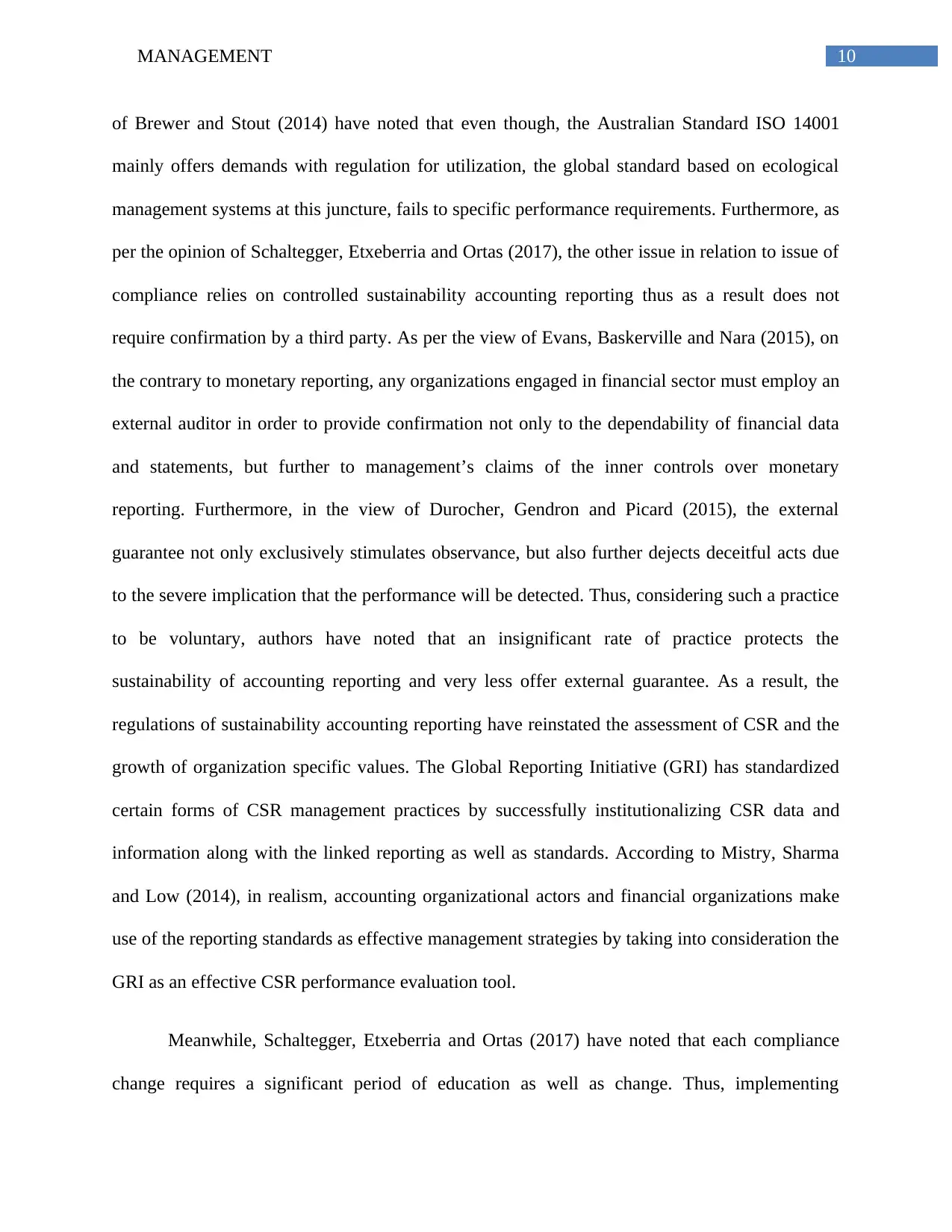
10MANAGEMENT
of Brewer and Stout (2014) have noted that even though, the Australian Standard ISO 14001
mainly offers demands with regulation for utilization, the global standard based on ecological
management systems at this juncture, fails to specific performance requirements. Furthermore, as
per the opinion of Schaltegger, Etxeberria and Ortas (2017), the other issue in relation to issue of
compliance relies on controlled sustainability accounting reporting thus as a result does not
require confirmation by a third party. As per the view of Evans, Baskerville and Nara (2015), on
the contrary to monetary reporting, any organizations engaged in financial sector must employ an
external auditor in order to provide confirmation not only to the dependability of financial data
and statements, but further to management’s claims of the inner controls over monetary
reporting. Furthermore, in the view of Durocher, Gendron and Picard (2015), the external
guarantee not only exclusively stimulates observance, but also further dejects deceitful acts due
to the severe implication that the performance will be detected. Thus, considering such a practice
to be voluntary, authors have noted that an insignificant rate of practice protects the
sustainability of accounting reporting and very less offer external guarantee. As a result, the
regulations of sustainability accounting reporting have reinstated the assessment of CSR and the
growth of organization specific values. The Global Reporting Initiative (GRI) has standardized
certain forms of CSR management practices by successfully institutionalizing CSR data and
information along with the linked reporting as well as standards. According to Mistry, Sharma
and Low (2014), in realism, accounting organizational actors and financial organizations make
use of the reporting standards as effective management strategies by taking into consideration the
GRI as an effective CSR performance evaluation tool.
Meanwhile, Schaltegger, Etxeberria and Ortas (2017) have noted that each compliance
change requires a significant period of education as well as change. Thus, implementing
of Brewer and Stout (2014) have noted that even though, the Australian Standard ISO 14001
mainly offers demands with regulation for utilization, the global standard based on ecological
management systems at this juncture, fails to specific performance requirements. Furthermore, as
per the opinion of Schaltegger, Etxeberria and Ortas (2017), the other issue in relation to issue of
compliance relies on controlled sustainability accounting reporting thus as a result does not
require confirmation by a third party. As per the view of Evans, Baskerville and Nara (2015), on
the contrary to monetary reporting, any organizations engaged in financial sector must employ an
external auditor in order to provide confirmation not only to the dependability of financial data
and statements, but further to management’s claims of the inner controls over monetary
reporting. Furthermore, in the view of Durocher, Gendron and Picard (2015), the external
guarantee not only exclusively stimulates observance, but also further dejects deceitful acts due
to the severe implication that the performance will be detected. Thus, considering such a practice
to be voluntary, authors have noted that an insignificant rate of practice protects the
sustainability of accounting reporting and very less offer external guarantee. As a result, the
regulations of sustainability accounting reporting have reinstated the assessment of CSR and the
growth of organization specific values. The Global Reporting Initiative (GRI) has standardized
certain forms of CSR management practices by successfully institutionalizing CSR data and
information along with the linked reporting as well as standards. According to Mistry, Sharma
and Low (2014), in realism, accounting organizational actors and financial organizations make
use of the reporting standards as effective management strategies by taking into consideration the
GRI as an effective CSR performance evaluation tool.
Meanwhile, Schaltegger, Etxeberria and Ortas (2017) have noted that each compliance
change requires a significant period of education as well as change. Thus, implementing
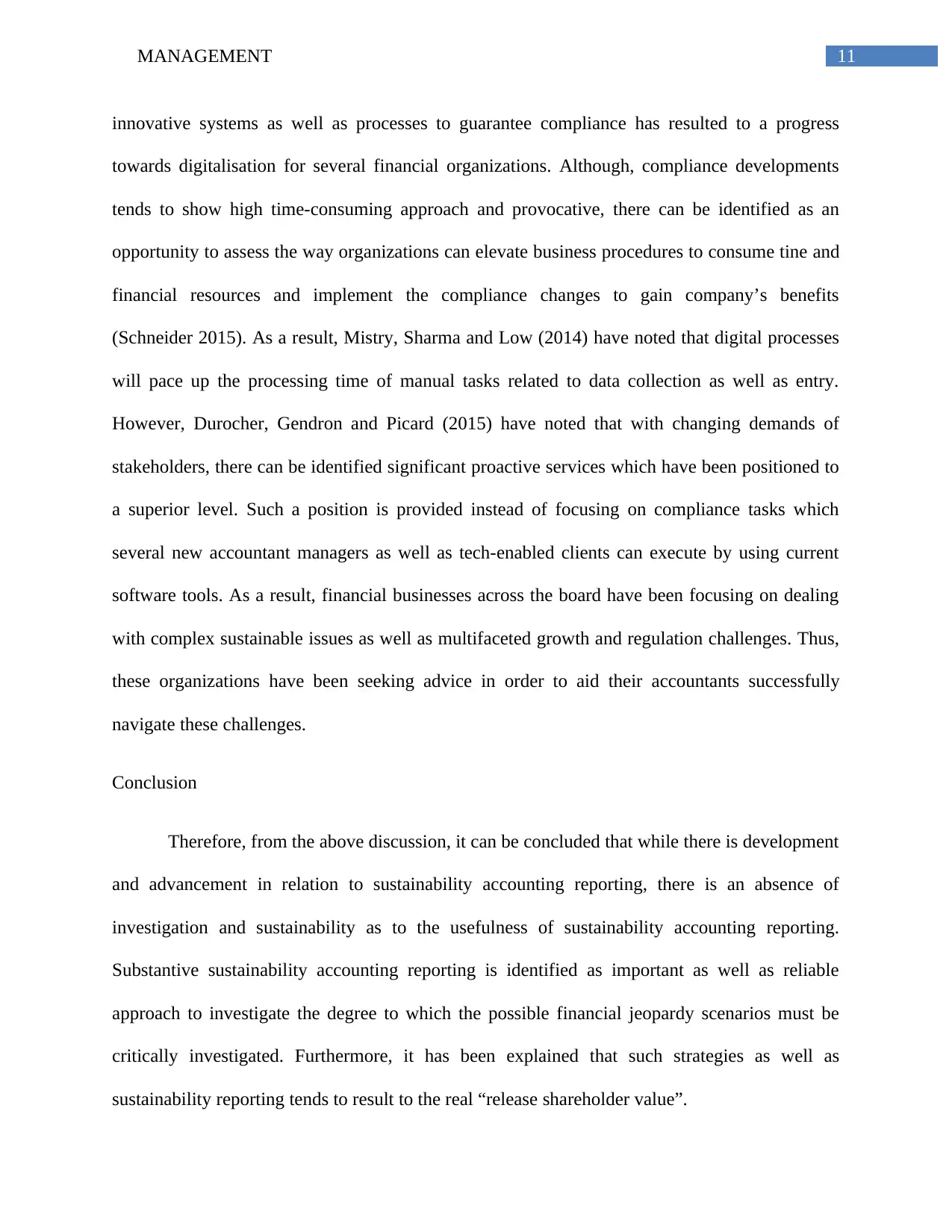
11MANAGEMENT
innovative systems as well as processes to guarantee compliance has resulted to a progress
towards digitalisation for several financial organizations. Although, compliance developments
tends to show high time-consuming approach and provocative, there can be identified as an
opportunity to assess the way organizations can elevate business procedures to consume tine and
financial resources and implement the compliance changes to gain company’s benefits
(Schneider 2015). As a result, Mistry, Sharma and Low (2014) have noted that digital processes
will pace up the processing time of manual tasks related to data collection as well as entry.
However, Durocher, Gendron and Picard (2015) have noted that with changing demands of
stakeholders, there can be identified significant proactive services which have been positioned to
a superior level. Such a position is provided instead of focusing on compliance tasks which
several new accountant managers as well as tech-enabled clients can execute by using current
software tools. As a result, financial businesses across the board have been focusing on dealing
with complex sustainable issues as well as multifaceted growth and regulation challenges. Thus,
these organizations have been seeking advice in order to aid their accountants successfully
navigate these challenges.
Conclusion
Therefore, from the above discussion, it can be concluded that while there is development
and advancement in relation to sustainability accounting reporting, there is an absence of
investigation and sustainability as to the usefulness of sustainability accounting reporting.
Substantive sustainability accounting reporting is identified as important as well as reliable
approach to investigate the degree to which the possible financial jeopardy scenarios must be
critically investigated. Furthermore, it has been explained that such strategies as well as
sustainability reporting tends to result to the real “release shareholder value”.
innovative systems as well as processes to guarantee compliance has resulted to a progress
towards digitalisation for several financial organizations. Although, compliance developments
tends to show high time-consuming approach and provocative, there can be identified as an
opportunity to assess the way organizations can elevate business procedures to consume tine and
financial resources and implement the compliance changes to gain company’s benefits
(Schneider 2015). As a result, Mistry, Sharma and Low (2014) have noted that digital processes
will pace up the processing time of manual tasks related to data collection as well as entry.
However, Durocher, Gendron and Picard (2015) have noted that with changing demands of
stakeholders, there can be identified significant proactive services which have been positioned to
a superior level. Such a position is provided instead of focusing on compliance tasks which
several new accountant managers as well as tech-enabled clients can execute by using current
software tools. As a result, financial businesses across the board have been focusing on dealing
with complex sustainable issues as well as multifaceted growth and regulation challenges. Thus,
these organizations have been seeking advice in order to aid their accountants successfully
navigate these challenges.
Conclusion
Therefore, from the above discussion, it can be concluded that while there is development
and advancement in relation to sustainability accounting reporting, there is an absence of
investigation and sustainability as to the usefulness of sustainability accounting reporting.
Substantive sustainability accounting reporting is identified as important as well as reliable
approach to investigate the degree to which the possible financial jeopardy scenarios must be
critically investigated. Furthermore, it has been explained that such strategies as well as
sustainability reporting tends to result to the real “release shareholder value”.
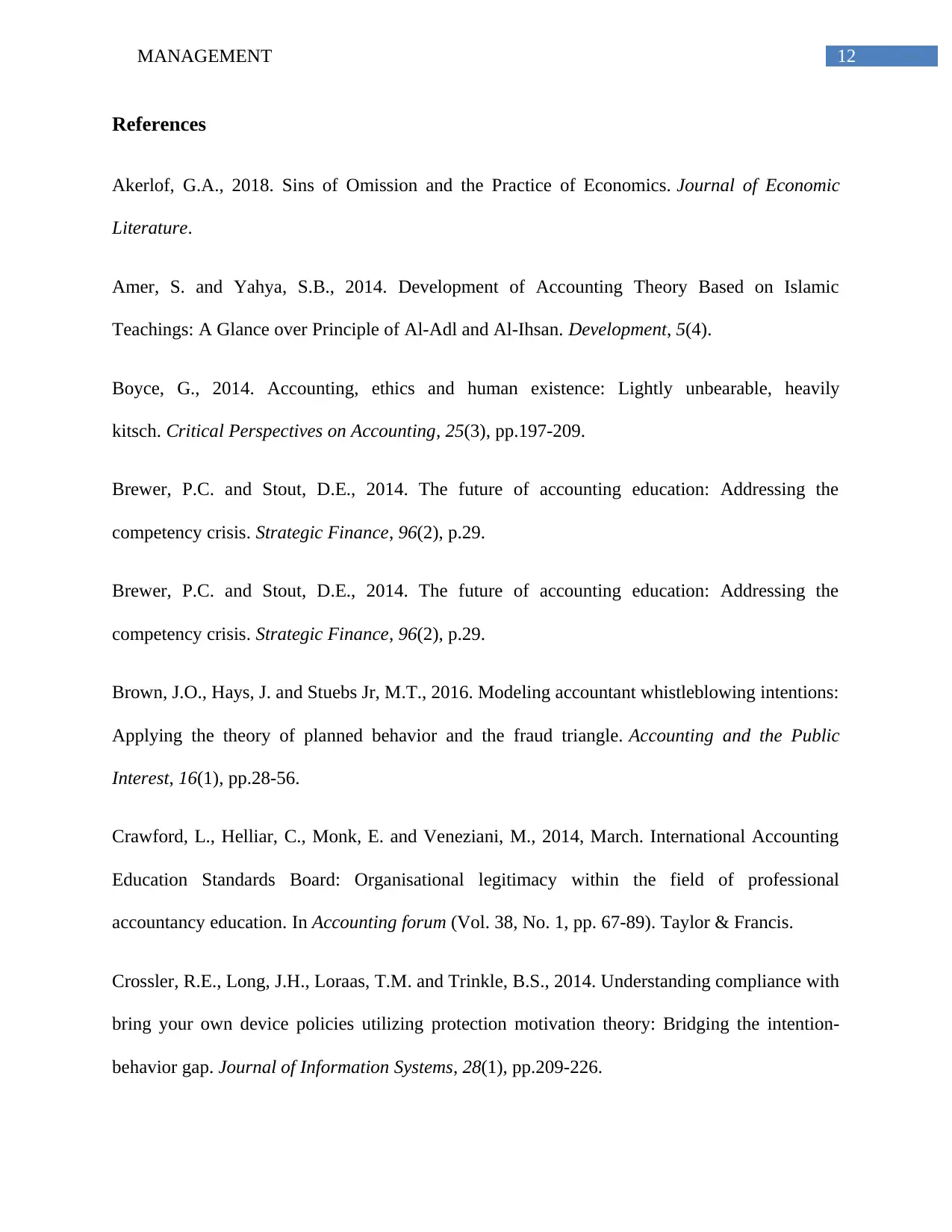
12MANAGEMENT
References
Akerlof, G.A., 2018. Sins of Omission and the Practice of Economics. Journal of Economic
Literature.
Amer, S. and Yahya, S.B., 2014. Development of Accounting Theory Based on Islamic
Teachings: A Glance over Principle of Al-Adl and Al-Ihsan. Development, 5(4).
Boyce, G., 2014. Accounting, ethics and human existence: Lightly unbearable, heavily
kitsch. Critical Perspectives on Accounting, 25(3), pp.197-209.
Brewer, P.C. and Stout, D.E., 2014. The future of accounting education: Addressing the
competency crisis. Strategic Finance, 96(2), p.29.
Brewer, P.C. and Stout, D.E., 2014. The future of accounting education: Addressing the
competency crisis. Strategic Finance, 96(2), p.29.
Brown, J.O., Hays, J. and Stuebs Jr, M.T., 2016. Modeling accountant whistleblowing intentions:
Applying the theory of planned behavior and the fraud triangle. Accounting and the Public
Interest, 16(1), pp.28-56.
Crawford, L., Helliar, C., Monk, E. and Veneziani, M., 2014, March. International Accounting
Education Standards Board: Organisational legitimacy within the field of professional
accountancy education. In Accounting forum (Vol. 38, No. 1, pp. 67-89). Taylor & Francis.
Crossler, R.E., Long, J.H., Loraas, T.M. and Trinkle, B.S., 2014. Understanding compliance with
bring your own device policies utilizing protection motivation theory: Bridging the intention-
behavior gap. Journal of Information Systems, 28(1), pp.209-226.
References
Akerlof, G.A., 2018. Sins of Omission and the Practice of Economics. Journal of Economic
Literature.
Amer, S. and Yahya, S.B., 2014. Development of Accounting Theory Based on Islamic
Teachings: A Glance over Principle of Al-Adl and Al-Ihsan. Development, 5(4).
Boyce, G., 2014. Accounting, ethics and human existence: Lightly unbearable, heavily
kitsch. Critical Perspectives on Accounting, 25(3), pp.197-209.
Brewer, P.C. and Stout, D.E., 2014. The future of accounting education: Addressing the
competency crisis. Strategic Finance, 96(2), p.29.
Brewer, P.C. and Stout, D.E., 2014. The future of accounting education: Addressing the
competency crisis. Strategic Finance, 96(2), p.29.
Brown, J.O., Hays, J. and Stuebs Jr, M.T., 2016. Modeling accountant whistleblowing intentions:
Applying the theory of planned behavior and the fraud triangle. Accounting and the Public
Interest, 16(1), pp.28-56.
Crawford, L., Helliar, C., Monk, E. and Veneziani, M., 2014, March. International Accounting
Education Standards Board: Organisational legitimacy within the field of professional
accountancy education. In Accounting forum (Vol. 38, No. 1, pp. 67-89). Taylor & Francis.
Crossler, R.E., Long, J.H., Loraas, T.M. and Trinkle, B.S., 2014. Understanding compliance with
bring your own device policies utilizing protection motivation theory: Bridging the intention-
behavior gap. Journal of Information Systems, 28(1), pp.209-226.
Paraphrase This Document
Need a fresh take? Get an instant paraphrase of this document with our AI Paraphraser
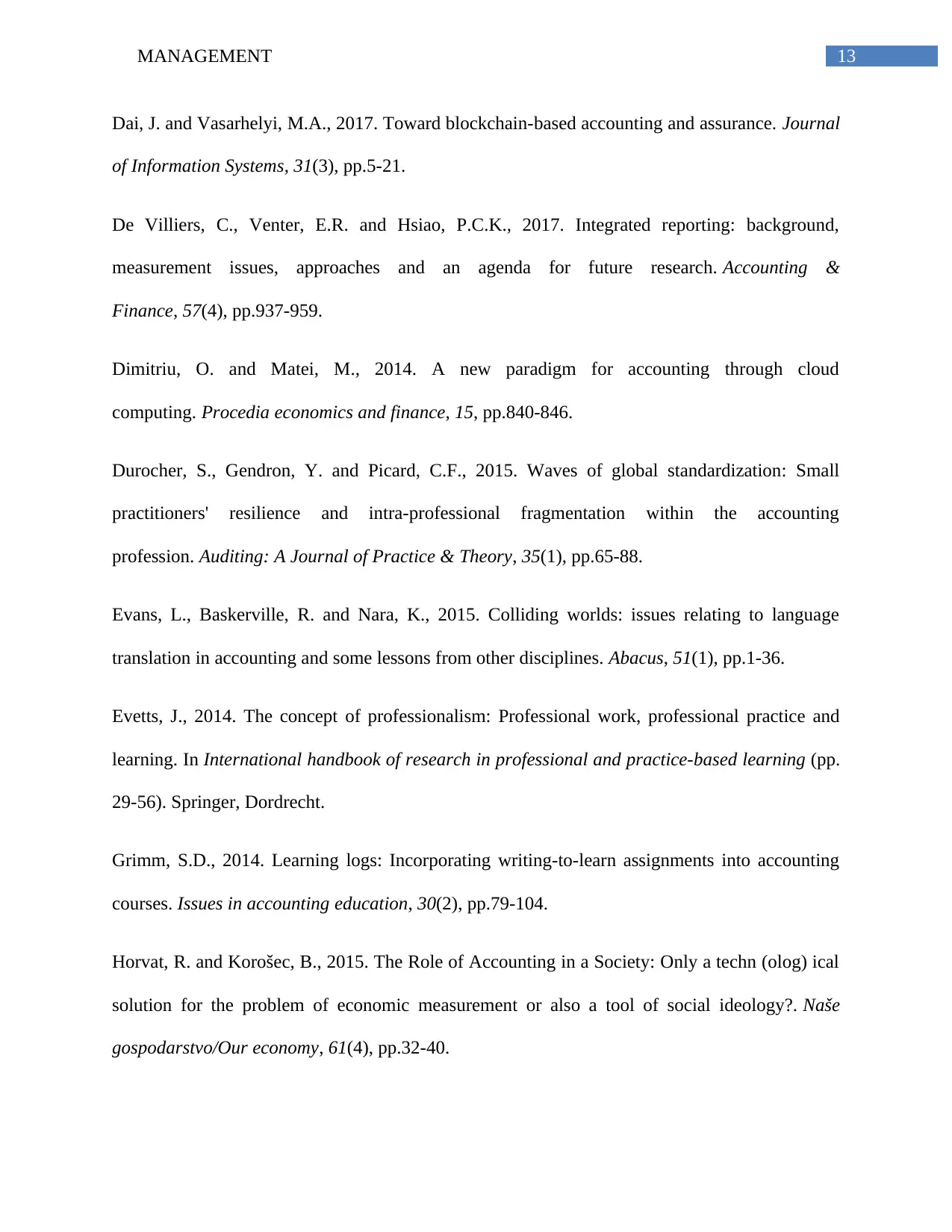
13MANAGEMENT
Dai, J. and Vasarhelyi, M.A., 2017. Toward blockchain-based accounting and assurance. Journal
of Information Systems, 31(3), pp.5-21.
De Villiers, C., Venter, E.R. and Hsiao, P.C.K., 2017. Integrated reporting: background,
measurement issues, approaches and an agenda for future research. Accounting &
Finance, 57(4), pp.937-959.
Dimitriu, O. and Matei, M., 2014. A new paradigm for accounting through cloud
computing. Procedia economics and finance, 15, pp.840-846.
Durocher, S., Gendron, Y. and Picard, C.F., 2015. Waves of global standardization: Small
practitioners' resilience and intra-professional fragmentation within the accounting
profession. Auditing: A Journal of Practice & Theory, 35(1), pp.65-88.
Evans, L., Baskerville, R. and Nara, K., 2015. Colliding worlds: issues relating to language
translation in accounting and some lessons from other disciplines. Abacus, 51(1), pp.1-36.
Evetts, J., 2014. The concept of professionalism: Professional work, professional practice and
learning. In International handbook of research in professional and practice-based learning (pp.
29-56). Springer, Dordrecht.
Grimm, S.D., 2014. Learning logs: Incorporating writing-to-learn assignments into accounting
courses. Issues in accounting education, 30(2), pp.79-104.
Horvat, R. and Korošec, B., 2015. The Role of Accounting in a Society: Only a techn (olog) ical
solution for the problem of economic measurement or also a tool of social ideology?. Naše
gospodarstvo/Our economy, 61(4), pp.32-40.
Dai, J. and Vasarhelyi, M.A., 2017. Toward blockchain-based accounting and assurance. Journal
of Information Systems, 31(3), pp.5-21.
De Villiers, C., Venter, E.R. and Hsiao, P.C.K., 2017. Integrated reporting: background,
measurement issues, approaches and an agenda for future research. Accounting &
Finance, 57(4), pp.937-959.
Dimitriu, O. and Matei, M., 2014. A new paradigm for accounting through cloud
computing. Procedia economics and finance, 15, pp.840-846.
Durocher, S., Gendron, Y. and Picard, C.F., 2015. Waves of global standardization: Small
practitioners' resilience and intra-professional fragmentation within the accounting
profession. Auditing: A Journal of Practice & Theory, 35(1), pp.65-88.
Evans, L., Baskerville, R. and Nara, K., 2015. Colliding worlds: issues relating to language
translation in accounting and some lessons from other disciplines. Abacus, 51(1), pp.1-36.
Evetts, J., 2014. The concept of professionalism: Professional work, professional practice and
learning. In International handbook of research in professional and practice-based learning (pp.
29-56). Springer, Dordrecht.
Grimm, S.D., 2014. Learning logs: Incorporating writing-to-learn assignments into accounting
courses. Issues in accounting education, 30(2), pp.79-104.
Horvat, R. and Korošec, B., 2015. The Role of Accounting in a Society: Only a techn (olog) ical
solution for the problem of economic measurement or also a tool of social ideology?. Naše
gospodarstvo/Our economy, 61(4), pp.32-40.
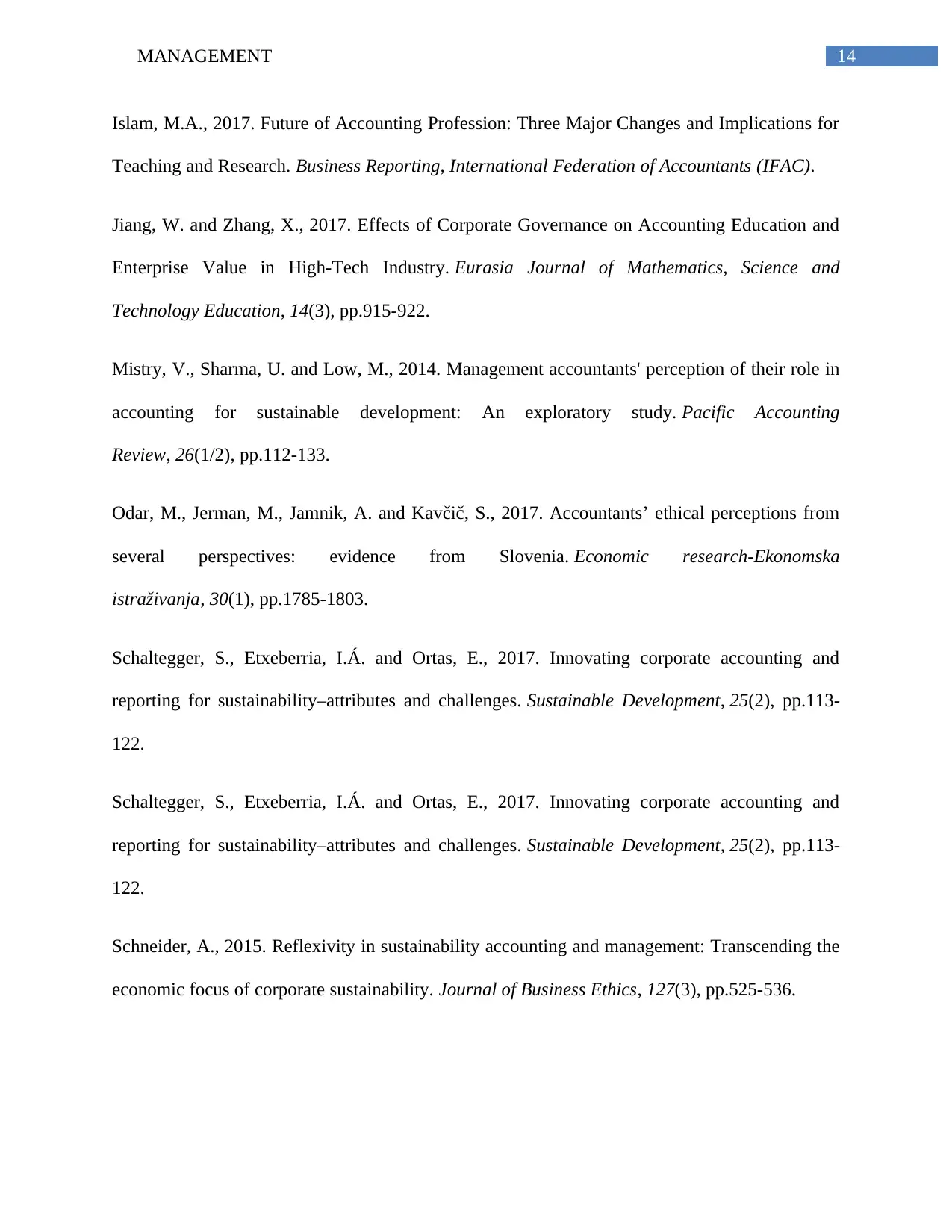
14MANAGEMENT
Islam, M.A., 2017. Future of Accounting Profession: Three Major Changes and Implications for
Teaching and Research. Business Reporting, International Federation of Accountants (IFAC).
Jiang, W. and Zhang, X., 2017. Effects of Corporate Governance on Accounting Education and
Enterprise Value in High-Tech Industry. Eurasia Journal of Mathematics, Science and
Technology Education, 14(3), pp.915-922.
Mistry, V., Sharma, U. and Low, M., 2014. Management accountants' perception of their role in
accounting for sustainable development: An exploratory study. Pacific Accounting
Review, 26(1/2), pp.112-133.
Odar, M., Jerman, M., Jamnik, A. and Kavčič, S., 2017. Accountants’ ethical perceptions from
several perspectives: evidence from Slovenia. Economic research-Ekonomska
istraživanja, 30(1), pp.1785-1803.
Schaltegger, S., Etxeberria, I.Á. and Ortas, E., 2017. Innovating corporate accounting and
reporting for sustainability–attributes and challenges. Sustainable Development, 25(2), pp.113-
122.
Schaltegger, S., Etxeberria, I.Á. and Ortas, E., 2017. Innovating corporate accounting and
reporting for sustainability–attributes and challenges. Sustainable Development, 25(2), pp.113-
122.
Schneider, A., 2015. Reflexivity in sustainability accounting and management: Transcending the
economic focus of corporate sustainability. Journal of Business Ethics, 127(3), pp.525-536.
Islam, M.A., 2017. Future of Accounting Profession: Three Major Changes and Implications for
Teaching and Research. Business Reporting, International Federation of Accountants (IFAC).
Jiang, W. and Zhang, X., 2017. Effects of Corporate Governance on Accounting Education and
Enterprise Value in High-Tech Industry. Eurasia Journal of Mathematics, Science and
Technology Education, 14(3), pp.915-922.
Mistry, V., Sharma, U. and Low, M., 2014. Management accountants' perception of their role in
accounting for sustainable development: An exploratory study. Pacific Accounting
Review, 26(1/2), pp.112-133.
Odar, M., Jerman, M., Jamnik, A. and Kavčič, S., 2017. Accountants’ ethical perceptions from
several perspectives: evidence from Slovenia. Economic research-Ekonomska
istraživanja, 30(1), pp.1785-1803.
Schaltegger, S., Etxeberria, I.Á. and Ortas, E., 2017. Innovating corporate accounting and
reporting for sustainability–attributes and challenges. Sustainable Development, 25(2), pp.113-
122.
Schaltegger, S., Etxeberria, I.Á. and Ortas, E., 2017. Innovating corporate accounting and
reporting for sustainability–attributes and challenges. Sustainable Development, 25(2), pp.113-
122.
Schneider, A., 2015. Reflexivity in sustainability accounting and management: Transcending the
economic focus of corporate sustainability. Journal of Business Ethics, 127(3), pp.525-536.
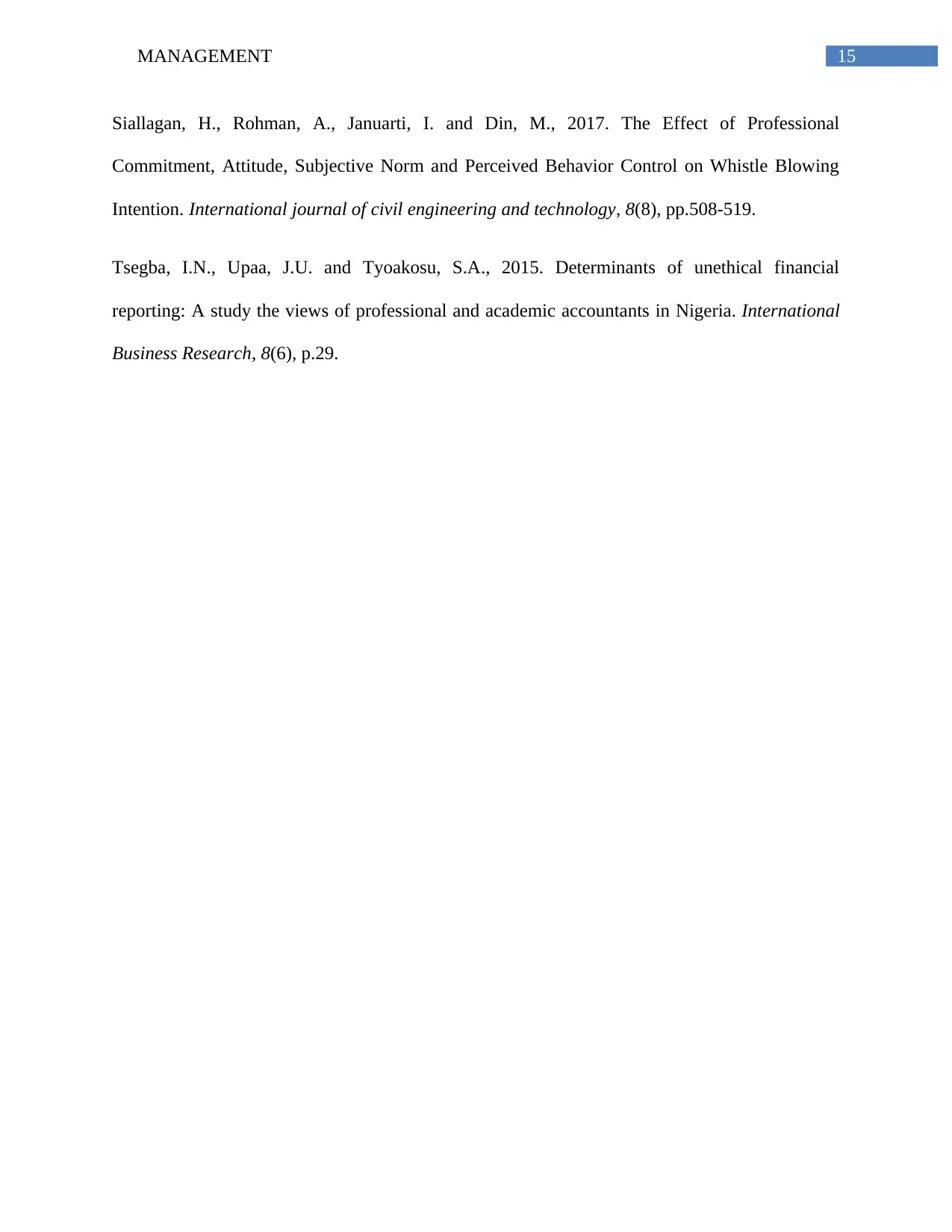
15MANAGEMENT
Siallagan, H., Rohman, A., Januarti, I. and Din, M., 2017. The Effect of Professional
Commitment, Attitude, Subjective Norm and Perceived Behavior Control on Whistle Blowing
Intention. International journal of civil engineering and technology, 8(8), pp.508-519.
Tsegba, I.N., Upaa, J.U. and Tyoakosu, S.A., 2015. Determinants of unethical financial
reporting: A study the views of professional and academic accountants in Nigeria. International
Business Research, 8(6), p.29.
Siallagan, H., Rohman, A., Januarti, I. and Din, M., 2017. The Effect of Professional
Commitment, Attitude, Subjective Norm and Perceived Behavior Control on Whistle Blowing
Intention. International journal of civil engineering and technology, 8(8), pp.508-519.
Tsegba, I.N., Upaa, J.U. and Tyoakosu, S.A., 2015. Determinants of unethical financial
reporting: A study the views of professional and academic accountants in Nigeria. International
Business Research, 8(6), p.29.
1 out of 16
Related Documents
Your All-in-One AI-Powered Toolkit for Academic Success.
+13062052269
info@desklib.com
Available 24*7 on WhatsApp / Email
![[object Object]](/_next/static/media/star-bottom.7253800d.svg)
Unlock your academic potential
© 2024 | Zucol Services PVT LTD | All rights reserved.





